Impact of Physical Activity on Mental Health
VerifiedAdded on 2020/10/22
|7
|1872
|198
AI Summary
The assignment examines the impact of physical activity on mental health, discussing how exercise can improve cognitive function, reduce stress, and support daily life activities. It also touches on the importance of physical fitness in maintaining overall health and wellbeing.
Contribute Materials
Your contribution can guide someone’s learning journey. Share your
documents today.
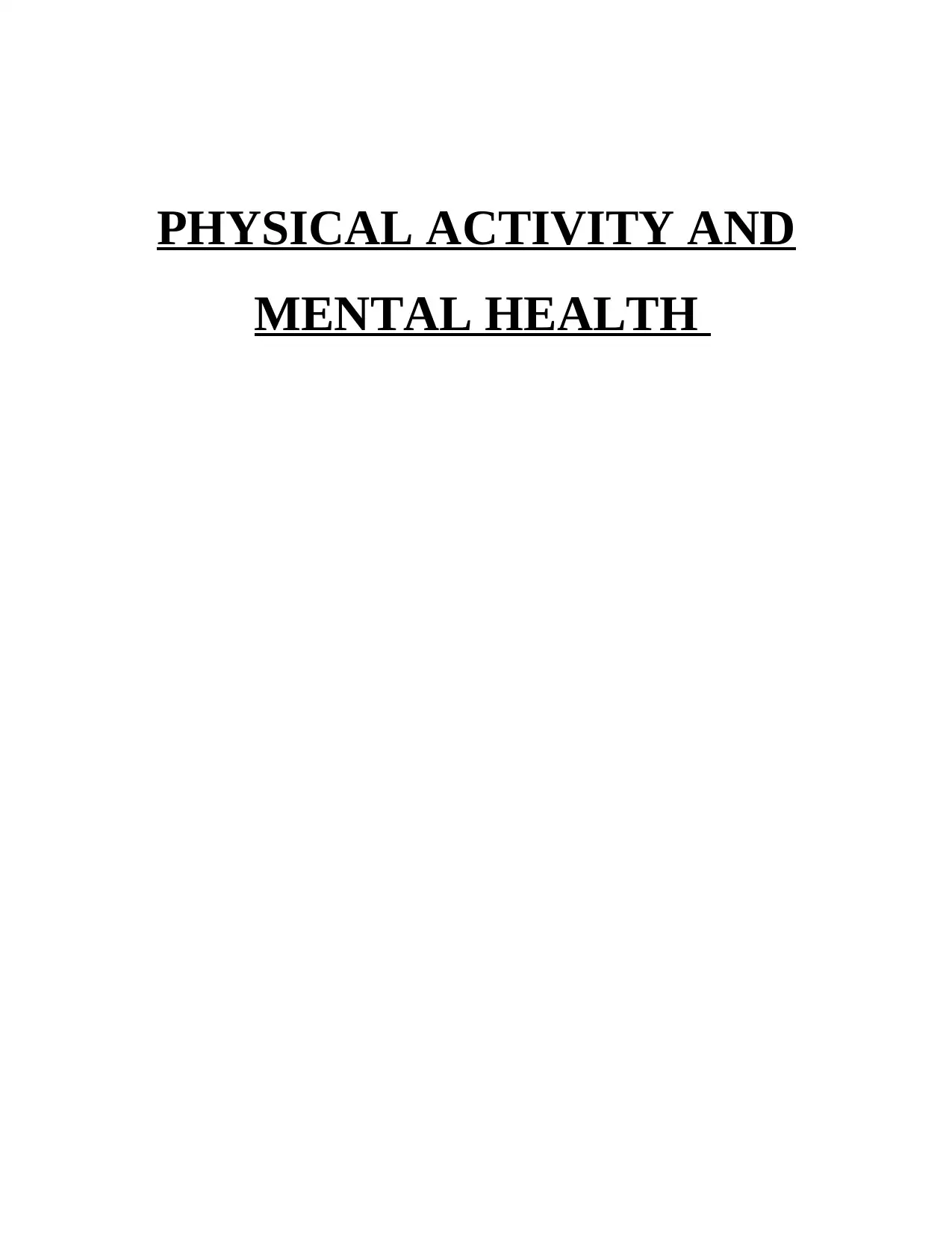
PHYSICAL ACTIVITY AND
MENTAL HEALTH
MENTAL HEALTH
Secure Best Marks with AI Grader
Need help grading? Try our AI Grader for instant feedback on your assignments.
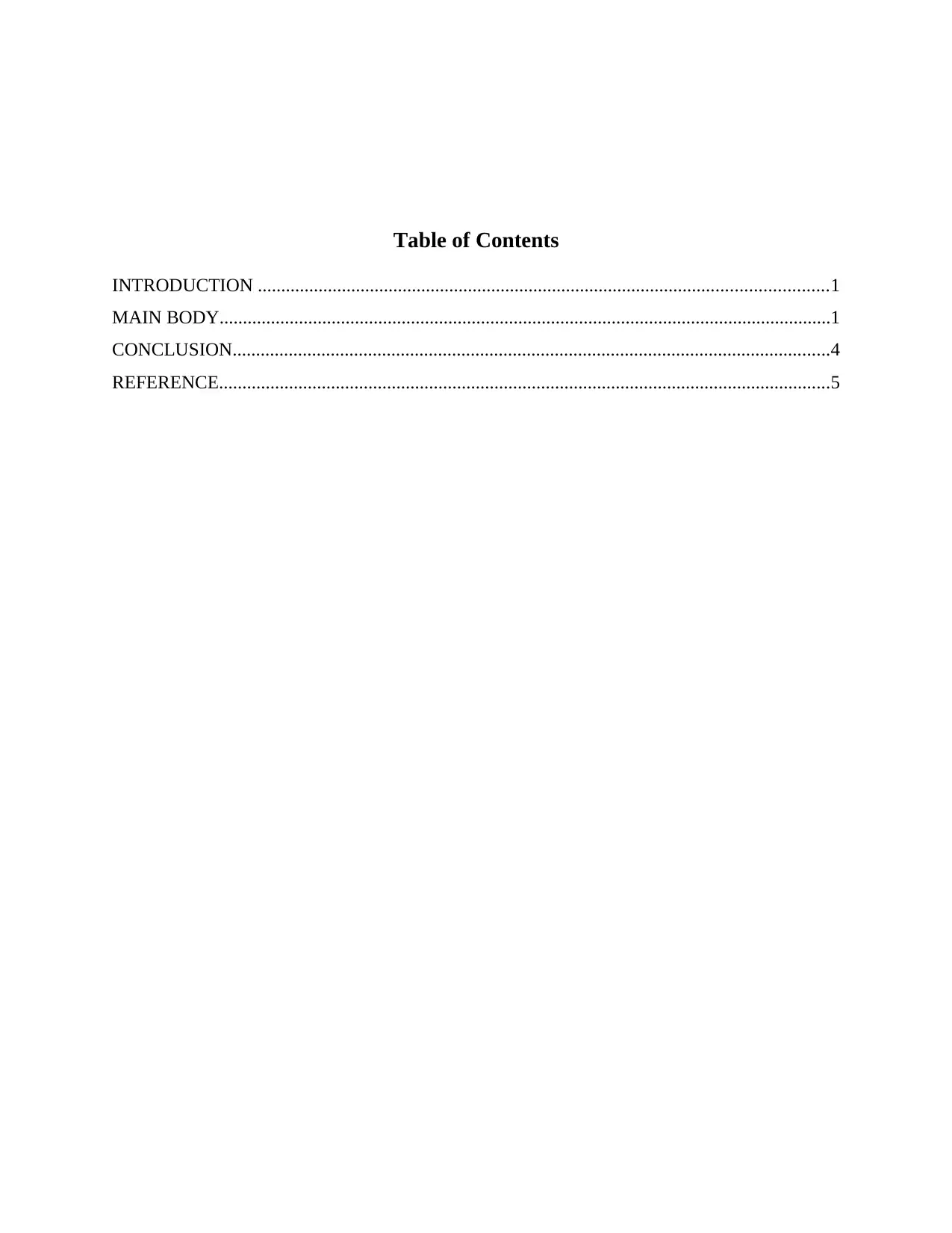
Table of Contents
INTRODUCTION ..........................................................................................................................1
MAIN BODY...................................................................................................................................1
CONCLUSION................................................................................................................................4
REFERENCE...................................................................................................................................5
INTRODUCTION ..........................................................................................................................1
MAIN BODY...................................................................................................................................1
CONCLUSION................................................................................................................................4
REFERENCE...................................................................................................................................5
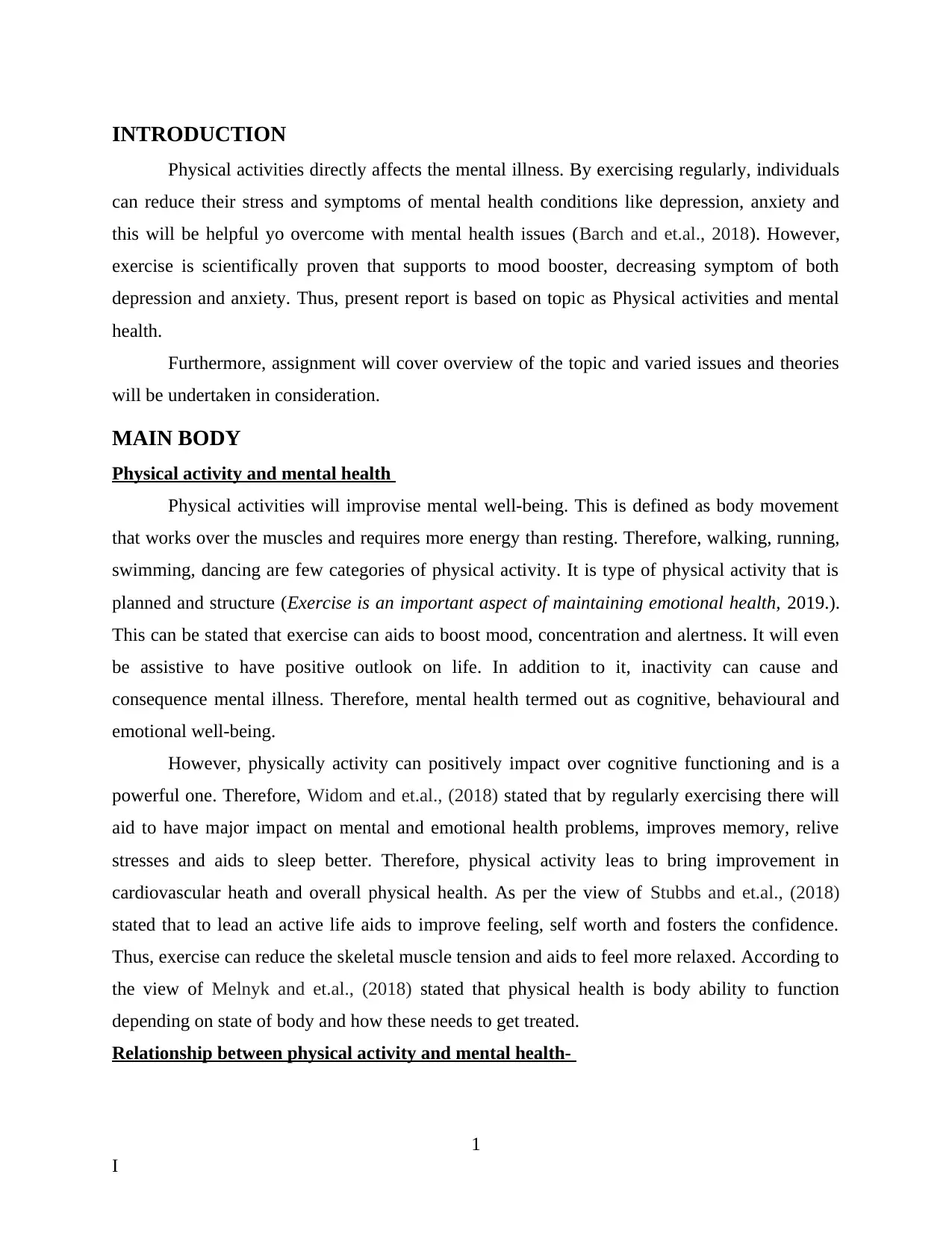
INTRODUCTION
Physical activities directly affects the mental illness. By exercising regularly, individuals
can reduce their stress and symptoms of mental health conditions like depression, anxiety and
this will be helpful yo overcome with mental health issues (Barch and et.al., 2018). However,
exercise is scientifically proven that supports to mood booster, decreasing symptom of both
depression and anxiety. Thus, present report is based on topic as Physical activities and mental
health.
Furthermore, assignment will cover overview of the topic and varied issues and theories
will be undertaken in consideration.
MAIN BODY
Physical activity and mental health
Physical activities will improvise mental well-being. This is defined as body movement
that works over the muscles and requires more energy than resting. Therefore, walking, running,
swimming, dancing are few categories of physical activity. It is type of physical activity that is
planned and structure (Exercise is an important aspect of maintaining emotional health, 2019.).
This can be stated that exercise can aids to boost mood, concentration and alertness. It will even
be assistive to have positive outlook on life. In addition to it, inactivity can cause and
consequence mental illness. Therefore, mental health termed out as cognitive, behavioural and
emotional well-being.
However, physically activity can positively impact over cognitive functioning and is a
powerful one. Therefore, Widom and et.al., (2018) stated that by regularly exercising there will
aid to have major impact on mental and emotional health problems, improves memory, relive
stresses and aids to sleep better. Therefore, physical activity leas to bring improvement in
cardiovascular heath and overall physical health. As per the view of Stubbs and et.al., (2018)
stated that to lead an active life aids to improve feeling, self worth and fosters the confidence.
Thus, exercise can reduce the skeletal muscle tension and aids to feel more relaxed. According to
the view of Melnyk and et.al., (2018) stated that physical health is body ability to function
depending on state of body and how these needs to get treated.
Relationship between physical activity and mental health-
1
I
Physical activities directly affects the mental illness. By exercising regularly, individuals
can reduce their stress and symptoms of mental health conditions like depression, anxiety and
this will be helpful yo overcome with mental health issues (Barch and et.al., 2018). However,
exercise is scientifically proven that supports to mood booster, decreasing symptom of both
depression and anxiety. Thus, present report is based on topic as Physical activities and mental
health.
Furthermore, assignment will cover overview of the topic and varied issues and theories
will be undertaken in consideration.
MAIN BODY
Physical activity and mental health
Physical activities will improvise mental well-being. This is defined as body movement
that works over the muscles and requires more energy than resting. Therefore, walking, running,
swimming, dancing are few categories of physical activity. It is type of physical activity that is
planned and structure (Exercise is an important aspect of maintaining emotional health, 2019.).
This can be stated that exercise can aids to boost mood, concentration and alertness. It will even
be assistive to have positive outlook on life. In addition to it, inactivity can cause and
consequence mental illness. Therefore, mental health termed out as cognitive, behavioural and
emotional well-being.
However, physically activity can positively impact over cognitive functioning and is a
powerful one. Therefore, Widom and et.al., (2018) stated that by regularly exercising there will
aid to have major impact on mental and emotional health problems, improves memory, relive
stresses and aids to sleep better. Therefore, physical activity leas to bring improvement in
cardiovascular heath and overall physical health. As per the view of Stubbs and et.al., (2018)
stated that to lead an active life aids to improve feeling, self worth and fosters the confidence.
Thus, exercise can reduce the skeletal muscle tension and aids to feel more relaxed. According to
the view of Melnyk and et.al., (2018) stated that physical health is body ability to function
depending on state of body and how these needs to get treated.
Relationship between physical activity and mental health-
1
I
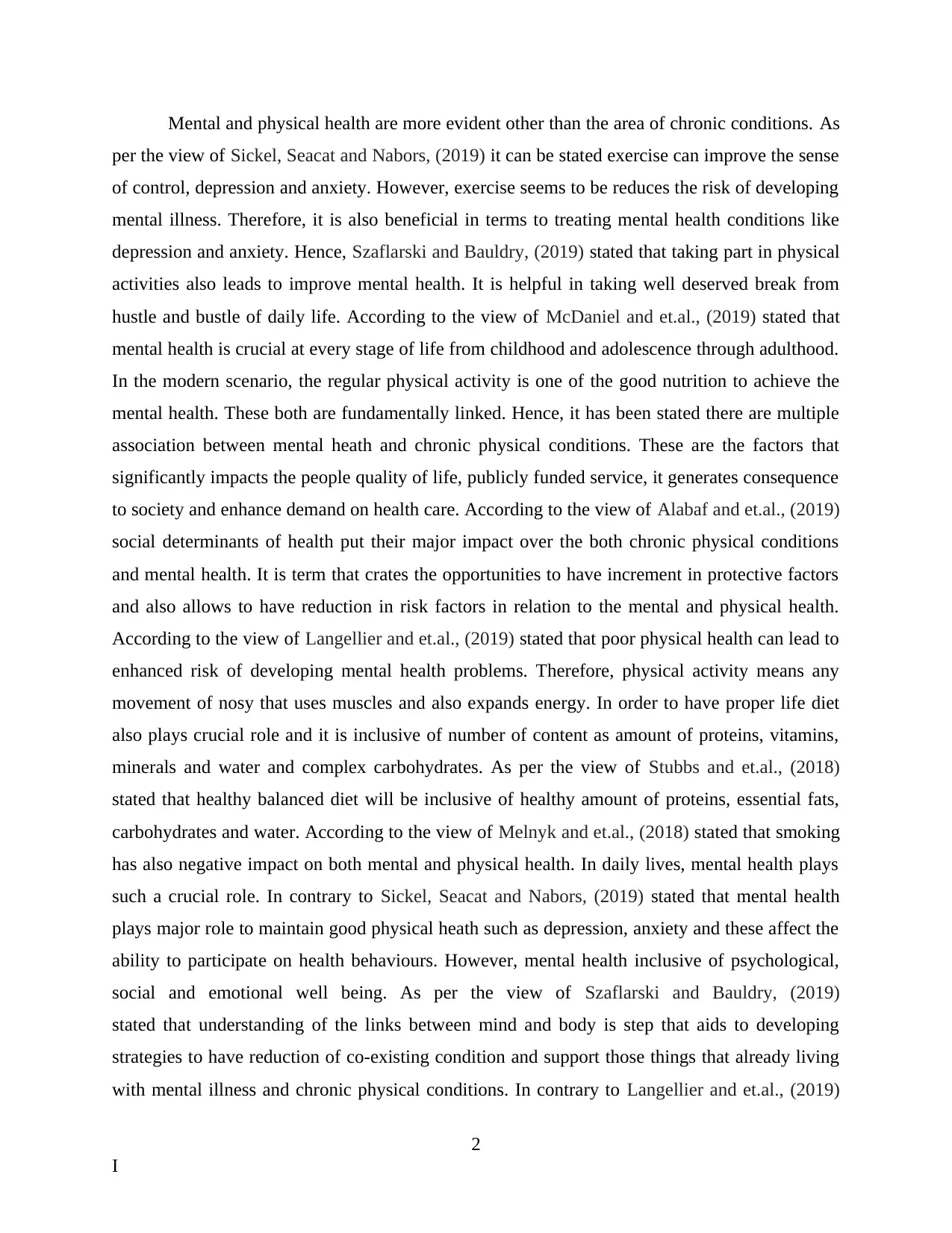
Mental and physical health are more evident other than the area of chronic conditions. As
per the view of Sickel, Seacat and Nabors, (2019) it can be stated exercise can improve the sense
of control, depression and anxiety. However, exercise seems to be reduces the risk of developing
mental illness. Therefore, it is also beneficial in terms to treating mental health conditions like
depression and anxiety. Hence, Szaflarski and Bauldry, (2019) stated that taking part in physical
activities also leads to improve mental health. It is helpful in taking well deserved break from
hustle and bustle of daily life. According to the view of McDaniel and et.al., (2019) stated that
mental health is crucial at every stage of life from childhood and adolescence through adulthood.
In the modern scenario, the regular physical activity is one of the good nutrition to achieve the
mental health. These both are fundamentally linked. Hence, it has been stated there are multiple
association between mental heath and chronic physical conditions. These are the factors that
significantly impacts the people quality of life, publicly funded service, it generates consequence
to society and enhance demand on health care. According to the view of Alabaf and et.al., (2019)
social determinants of health put their major impact over the both chronic physical conditions
and mental health. It is term that crates the opportunities to have increment in protective factors
and also allows to have reduction in risk factors in relation to the mental and physical health.
According to the view of Langellier and et.al., (2019) stated that poor physical health can lead to
enhanced risk of developing mental health problems. Therefore, physical activity means any
movement of nosy that uses muscles and also expands energy. In order to have proper life diet
also plays crucial role and it is inclusive of number of content as amount of proteins, vitamins,
minerals and water and complex carbohydrates. As per the view of Stubbs and et.al., (2018)
stated that healthy balanced diet will be inclusive of healthy amount of proteins, essential fats,
carbohydrates and water. According to the view of Melnyk and et.al., (2018) stated that smoking
has also negative impact on both mental and physical health. In daily lives, mental health plays
such a crucial role. In contrary to Sickel, Seacat and Nabors, (2019) stated that mental health
plays major role to maintain good physical heath such as depression, anxiety and these affect the
ability to participate on health behaviours. However, mental health inclusive of psychological,
social and emotional well being. As per the view of Szaflarski and Bauldry, (2019)
stated that understanding of the links between mind and body is step that aids to developing
strategies to have reduction of co-existing condition and support those things that already living
with mental illness and chronic physical conditions. In contrary to Langellier and et.al., (2019)
2
I
per the view of Sickel, Seacat and Nabors, (2019) it can be stated exercise can improve the sense
of control, depression and anxiety. However, exercise seems to be reduces the risk of developing
mental illness. Therefore, it is also beneficial in terms to treating mental health conditions like
depression and anxiety. Hence, Szaflarski and Bauldry, (2019) stated that taking part in physical
activities also leads to improve mental health. It is helpful in taking well deserved break from
hustle and bustle of daily life. According to the view of McDaniel and et.al., (2019) stated that
mental health is crucial at every stage of life from childhood and adolescence through adulthood.
In the modern scenario, the regular physical activity is one of the good nutrition to achieve the
mental health. These both are fundamentally linked. Hence, it has been stated there are multiple
association between mental heath and chronic physical conditions. These are the factors that
significantly impacts the people quality of life, publicly funded service, it generates consequence
to society and enhance demand on health care. According to the view of Alabaf and et.al., (2019)
social determinants of health put their major impact over the both chronic physical conditions
and mental health. It is term that crates the opportunities to have increment in protective factors
and also allows to have reduction in risk factors in relation to the mental and physical health.
According to the view of Langellier and et.al., (2019) stated that poor physical health can lead to
enhanced risk of developing mental health problems. Therefore, physical activity means any
movement of nosy that uses muscles and also expands energy. In order to have proper life diet
also plays crucial role and it is inclusive of number of content as amount of proteins, vitamins,
minerals and water and complex carbohydrates. As per the view of Stubbs and et.al., (2018)
stated that healthy balanced diet will be inclusive of healthy amount of proteins, essential fats,
carbohydrates and water. According to the view of Melnyk and et.al., (2018) stated that smoking
has also negative impact on both mental and physical health. In daily lives, mental health plays
such a crucial role. In contrary to Sickel, Seacat and Nabors, (2019) stated that mental health
plays major role to maintain good physical heath such as depression, anxiety and these affect the
ability to participate on health behaviours. However, mental health inclusive of psychological,
social and emotional well being. As per the view of Szaflarski and Bauldry, (2019)
stated that understanding of the links between mind and body is step that aids to developing
strategies to have reduction of co-existing condition and support those things that already living
with mental illness and chronic physical conditions. In contrary to Langellier and et.al., (2019)
2
I
Secure Best Marks with AI Grader
Need help grading? Try our AI Grader for instant feedback on your assignments.
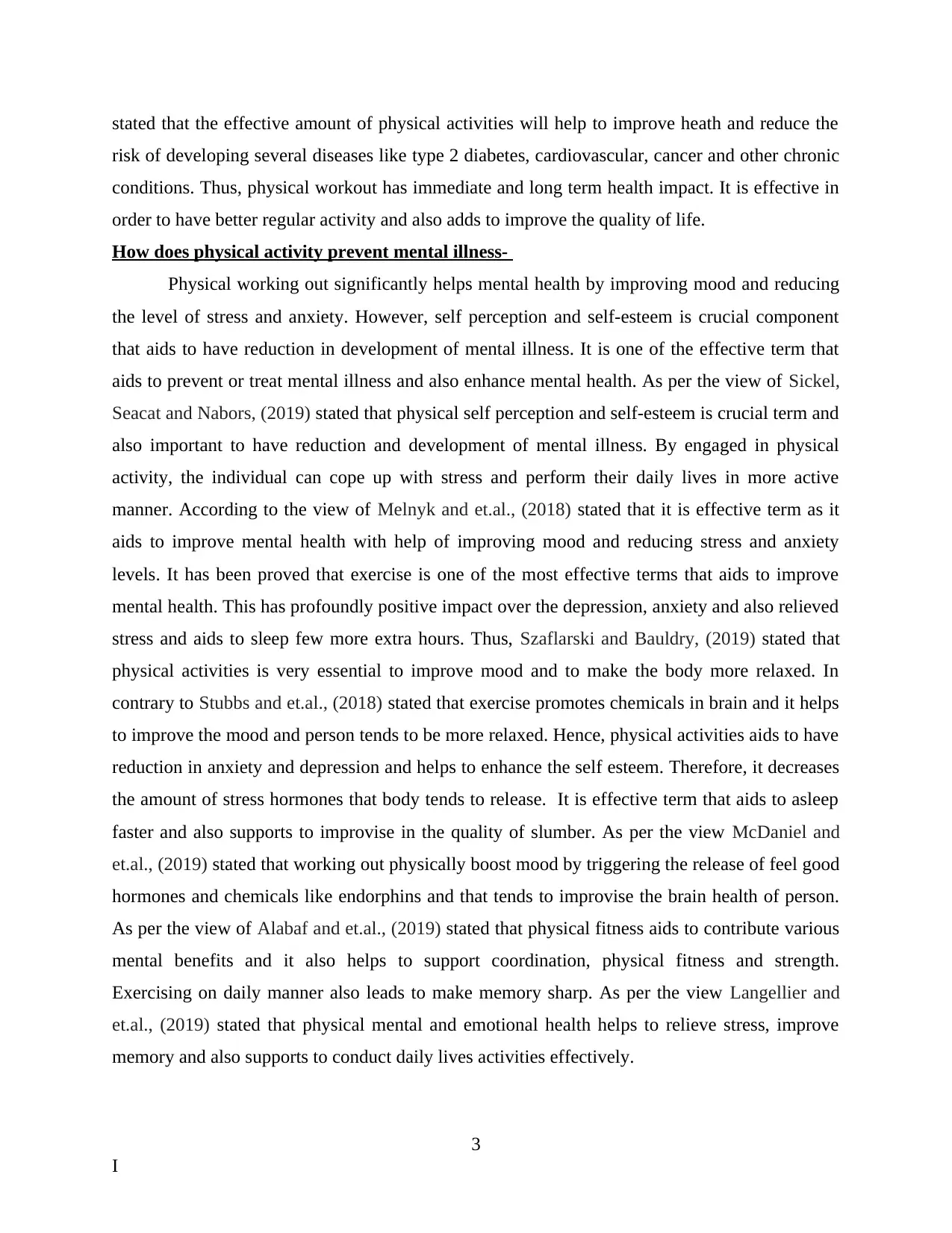
stated that the effective amount of physical activities will help to improve heath and reduce the
risk of developing several diseases like type 2 diabetes, cardiovascular, cancer and other chronic
conditions. Thus, physical workout has immediate and long term health impact. It is effective in
order to have better regular activity and also adds to improve the quality of life.
How does physical activity prevent mental illness-
Physical working out significantly helps mental health by improving mood and reducing
the level of stress and anxiety. However, self perception and self-esteem is crucial component
that aids to have reduction in development of mental illness. It is one of the effective term that
aids to prevent or treat mental illness and also enhance mental health. As per the view of Sickel,
Seacat and Nabors, (2019) stated that physical self perception and self-esteem is crucial term and
also important to have reduction and development of mental illness. By engaged in physical
activity, the individual can cope up with stress and perform their daily lives in more active
manner. According to the view of Melnyk and et.al., (2018) stated that it is effective term as it
aids to improve mental health with help of improving mood and reducing stress and anxiety
levels. It has been proved that exercise is one of the most effective terms that aids to improve
mental health. This has profoundly positive impact over the depression, anxiety and also relieved
stress and aids to sleep few more extra hours. Thus, Szaflarski and Bauldry, (2019) stated that
physical activities is very essential to improve mood and to make the body more relaxed. In
contrary to Stubbs and et.al., (2018) stated that exercise promotes chemicals in brain and it helps
to improve the mood and person tends to be more relaxed. Hence, physical activities aids to have
reduction in anxiety and depression and helps to enhance the self esteem. Therefore, it decreases
the amount of stress hormones that body tends to release. It is effective term that aids to asleep
faster and also supports to improvise in the quality of slumber. As per the view McDaniel and
et.al., (2019) stated that working out physically boost mood by triggering the release of feel good
hormones and chemicals like endorphins and that tends to improvise the brain health of person.
As per the view of Alabaf and et.al., (2019) stated that physical fitness aids to contribute various
mental benefits and it also helps to support coordination, physical fitness and strength.
Exercising on daily manner also leads to make memory sharp. As per the view Langellier and
et.al., (2019) stated that physical mental and emotional health helps to relieve stress, improve
memory and also supports to conduct daily lives activities effectively.
3
I
risk of developing several diseases like type 2 diabetes, cardiovascular, cancer and other chronic
conditions. Thus, physical workout has immediate and long term health impact. It is effective in
order to have better regular activity and also adds to improve the quality of life.
How does physical activity prevent mental illness-
Physical working out significantly helps mental health by improving mood and reducing
the level of stress and anxiety. However, self perception and self-esteem is crucial component
that aids to have reduction in development of mental illness. It is one of the effective term that
aids to prevent or treat mental illness and also enhance mental health. As per the view of Sickel,
Seacat and Nabors, (2019) stated that physical self perception and self-esteem is crucial term and
also important to have reduction and development of mental illness. By engaged in physical
activity, the individual can cope up with stress and perform their daily lives in more active
manner. According to the view of Melnyk and et.al., (2018) stated that it is effective term as it
aids to improve mental health with help of improving mood and reducing stress and anxiety
levels. It has been proved that exercise is one of the most effective terms that aids to improve
mental health. This has profoundly positive impact over the depression, anxiety and also relieved
stress and aids to sleep few more extra hours. Thus, Szaflarski and Bauldry, (2019) stated that
physical activities is very essential to improve mood and to make the body more relaxed. In
contrary to Stubbs and et.al., (2018) stated that exercise promotes chemicals in brain and it helps
to improve the mood and person tends to be more relaxed. Hence, physical activities aids to have
reduction in anxiety and depression and helps to enhance the self esteem. Therefore, it decreases
the amount of stress hormones that body tends to release. It is effective term that aids to asleep
faster and also supports to improvise in the quality of slumber. As per the view McDaniel and
et.al., (2019) stated that working out physically boost mood by triggering the release of feel good
hormones and chemicals like endorphins and that tends to improvise the brain health of person.
As per the view of Alabaf and et.al., (2019) stated that physical fitness aids to contribute various
mental benefits and it also helps to support coordination, physical fitness and strength.
Exercising on daily manner also leads to make memory sharp. As per the view Langellier and
et.al., (2019) stated that physical mental and emotional health helps to relieve stress, improve
memory and also supports to conduct daily lives activities effectively.
3
I

CONCLUSION
Hereby, it can be concluded that physical activity have major impact over the mental
health. Mental health termed out as cognitive, behavioural and emotional well-being. It is term
that can affect daily life, relationships and physical health. Therefore, report has covered the
depth review over the relationship of physical activities to mental health.
4
I
Hereby, it can be concluded that physical activity have major impact over the mental
health. Mental health termed out as cognitive, behavioural and emotional well-being. It is term
that can affect daily life, relationships and physical health. Therefore, report has covered the
depth review over the relationship of physical activities to mental health.
4
I
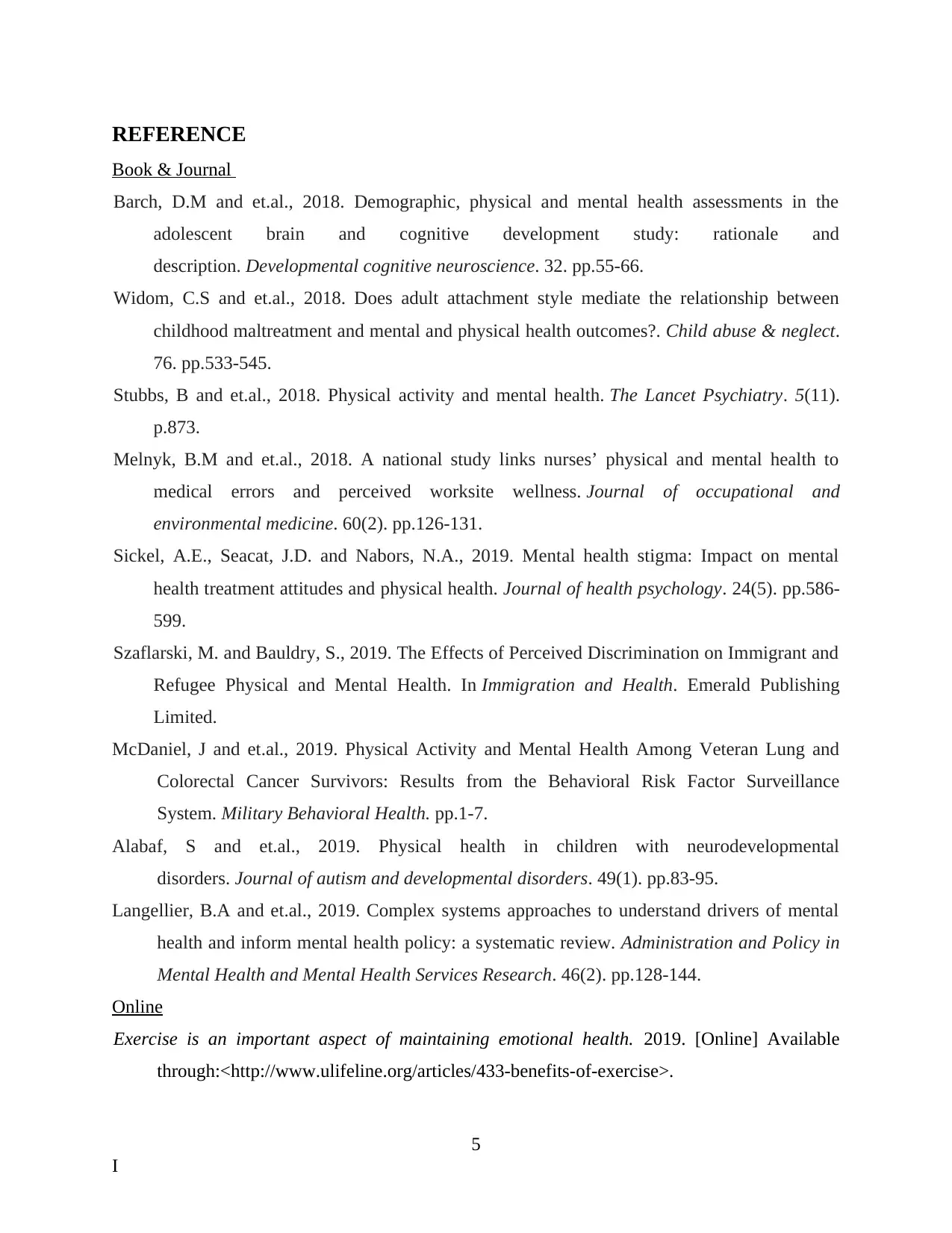
REFERENCE
Book & Journal
Barch, D.M and et.al., 2018. Demographic, physical and mental health assessments in the
adolescent brain and cognitive development study: rationale and
description. Developmental cognitive neuroscience. 32. pp.55-66.
Widom, C.S and et.al., 2018. Does adult attachment style mediate the relationship between
childhood maltreatment and mental and physical health outcomes?. Child abuse & neglect.
76. pp.533-545.
Stubbs, B and et.al., 2018. Physical activity and mental health. The Lancet Psychiatry. 5(11).
p.873.
Melnyk, B.M and et.al., 2018. A national study links nurses’ physical and mental health to
medical errors and perceived worksite wellness. Journal of occupational and
environmental medicine. 60(2). pp.126-131.
Sickel, A.E., Seacat, J.D. and Nabors, N.A., 2019. Mental health stigma: Impact on mental
health treatment attitudes and physical health. Journal of health psychology. 24(5). pp.586-
599.
Szaflarski, M. and Bauldry, S., 2019. The Effects of Perceived Discrimination on Immigrant and
Refugee Physical and Mental Health. In Immigration and Health. Emerald Publishing
Limited.
McDaniel, J and et.al., 2019. Physical Activity and Mental Health Among Veteran Lung and
Colorectal Cancer Survivors: Results from the Behavioral Risk Factor Surveillance
System. Military Behavioral Health. pp.1-7.
Alabaf, S and et.al., 2019. Physical health in children with neurodevelopmental
disorders. Journal of autism and developmental disorders. 49(1). pp.83-95.
Langellier, B.A and et.al., 2019. Complex systems approaches to understand drivers of mental
health and inform mental health policy: a systematic review. Administration and Policy in
Mental Health and Mental Health Services Research. 46(2). pp.128-144.
Online
Exercise is an important aspect of maintaining emotional health. 2019. [Online] Available
through:<http://www.ulifeline.org/articles/433-benefits-of-exercise>.
5
I
Book & Journal
Barch, D.M and et.al., 2018. Demographic, physical and mental health assessments in the
adolescent brain and cognitive development study: rationale and
description. Developmental cognitive neuroscience. 32. pp.55-66.
Widom, C.S and et.al., 2018. Does adult attachment style mediate the relationship between
childhood maltreatment and mental and physical health outcomes?. Child abuse & neglect.
76. pp.533-545.
Stubbs, B and et.al., 2018. Physical activity and mental health. The Lancet Psychiatry. 5(11).
p.873.
Melnyk, B.M and et.al., 2018. A national study links nurses’ physical and mental health to
medical errors and perceived worksite wellness. Journal of occupational and
environmental medicine. 60(2). pp.126-131.
Sickel, A.E., Seacat, J.D. and Nabors, N.A., 2019. Mental health stigma: Impact on mental
health treatment attitudes and physical health. Journal of health psychology. 24(5). pp.586-
599.
Szaflarski, M. and Bauldry, S., 2019. The Effects of Perceived Discrimination on Immigrant and
Refugee Physical and Mental Health. In Immigration and Health. Emerald Publishing
Limited.
McDaniel, J and et.al., 2019. Physical Activity and Mental Health Among Veteran Lung and
Colorectal Cancer Survivors: Results from the Behavioral Risk Factor Surveillance
System. Military Behavioral Health. pp.1-7.
Alabaf, S and et.al., 2019. Physical health in children with neurodevelopmental
disorders. Journal of autism and developmental disorders. 49(1). pp.83-95.
Langellier, B.A and et.al., 2019. Complex systems approaches to understand drivers of mental
health and inform mental health policy: a systematic review. Administration and Policy in
Mental Health and Mental Health Services Research. 46(2). pp.128-144.
Online
Exercise is an important aspect of maintaining emotional health. 2019. [Online] Available
through:<http://www.ulifeline.org/articles/433-benefits-of-exercise>.
5
I
1 out of 7
Related Documents
Your All-in-One AI-Powered Toolkit for Academic Success.
+13062052269
info@desklib.com
Available 24*7 on WhatsApp / Email
![[object Object]](/_next/static/media/star-bottom.7253800d.svg)
Unlock your academic potential
© 2024 | Zucol Services PVT LTD | All rights reserved.





